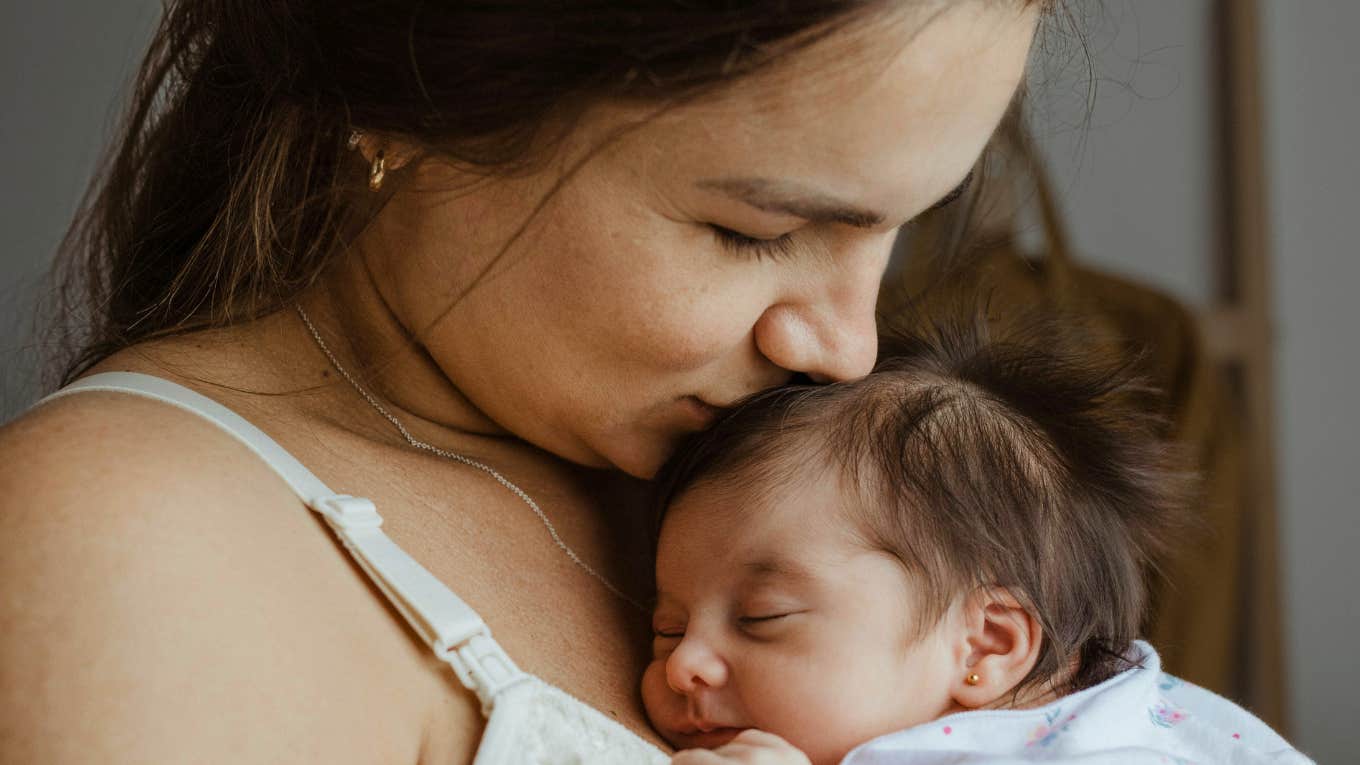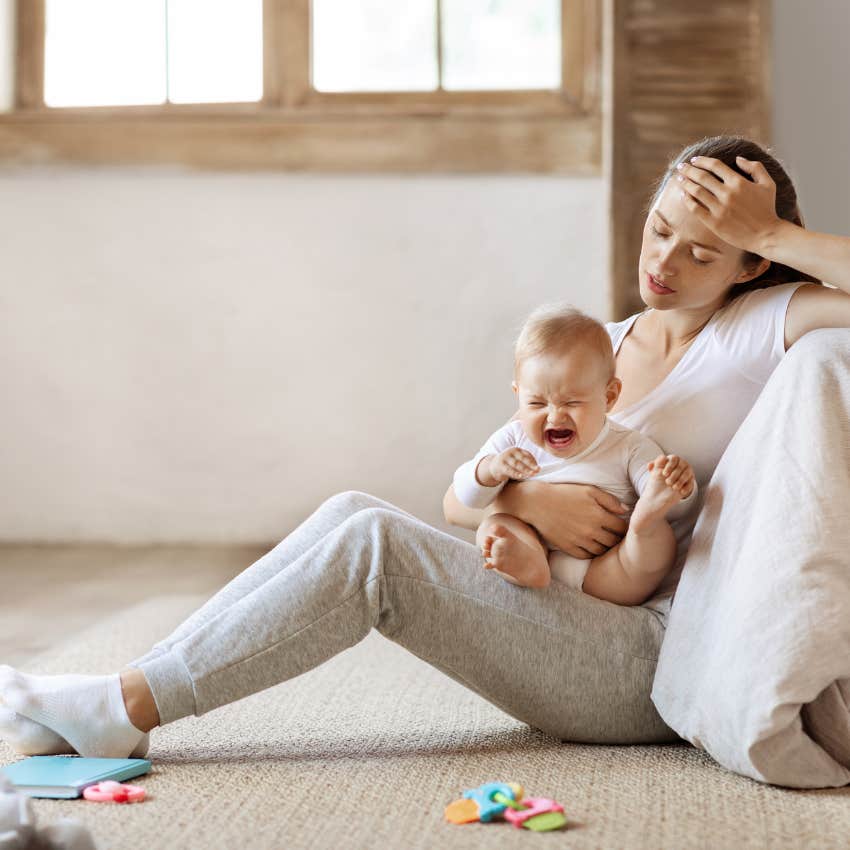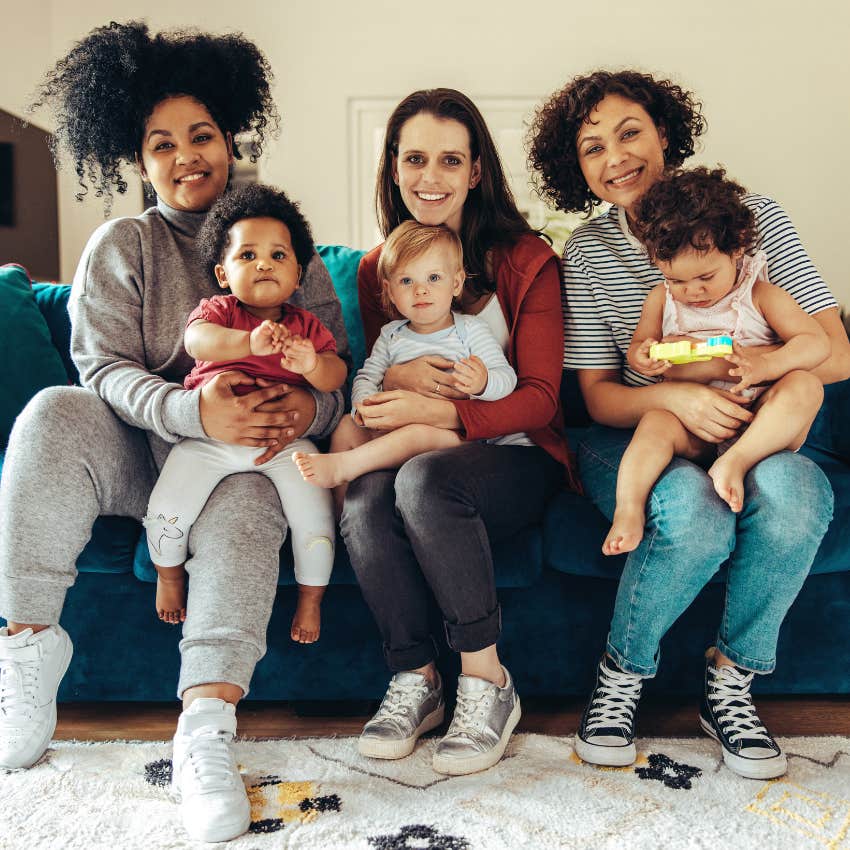I Genuinely Wish Someone Had Sat Me Down And Said This Before I Had Kids
Do it differently. Do it very, very differently.
 Jonathan Borba | Unsplash
Jonathan Borba | Unsplash Should I have kids? This is a question that many younger women in my life are currently grappling with. None of them has explicitly asked for my opinion or advice, so I have refrained from giving it.
I never really asked myself, Should I have kids? Like many middle-class, college-educated Xennial women, I was focused on following the playbook: start my career, find someone good enough to marry, buy a home, have children, do it all.
The question that primarily concerned us was when we should have kids, and no one seemed to have any good unsolicited advice on that one. Have kids in your 20s and you ruin your chance of getting your career off the ground. Have kids in your 30s, and you upend your career just as it’s beginning to bear fruit. Have kids in your 40s and, to hear the man doctors tell it, you risk certain death.
Most of us had kids somewhere in our 30s, maybe early 40s, and we spent the ensuing years of our lives schlepping breast milk on subways, frantically adding our names to daycare waitlists, fighting sleep during afternoon work meetings, wondering why couldn’t make it look as easy as Claire Huxtable did, and attempting to piece together a job that paid the (alarmingly onerous) childcare bills from the broken shards of our careers.
Here's what I wish someone would have said to me before having kids: Don’t have kids the way I had kids.
 Prostock-studio / Shutterstock
Prostock-studio / Shutterstock
Also: Don’t have kids the way most of us still have kids.
If you are truly considering embarking on this harrowing and transformative journey, you absolutely must do it differently. Completely differently. I don’t like saying “must” — it makes me sound smug and judgmental — but you have to trust me on this one. Or, at least, just read to the end of this story and then decide for yourself.
What do I mean by “do it differently?” First and foremost, I urge you to do it with a great deal of intention. Don’t just get pregnant because it’s the next thing to do in the love, marriage, kids progression.
Don’t just assume everything will fall into place (it probably won’t). Don’t assume a spouse will be able to offer all the support you need (they definitely won’t). Don’t assume the government or corporate America will in any way accommodate your life transition (they absolutely, definitely will not).
Having kids differently asks you to consider the following sad realities:
- Nuclear families are more and more isolated.
- Childcare is increasingly harder to find and afford.
- There are fewer and fewer multigenerational spaces that welcome, or even accommodate, children.
- The companies to which most of us dedicate the majority of our waking hours don’t care about us, and they especially don’t care about our caregiving needs.
- The lack of U.S. government infrastructure to support families is appalling and will get worse before it gets better, if it ever gets better.
This may sound like a lot of doom and gloom. It is pretty depressing, and it’s why parenting in the 21st century, particularly in the United States, and particularly for mothers, has become so incredibly stressful. If you’re one of those Millennials or Gen Z’ers whose online forays into the question of motherhood have implanted ominous seeds of dread, you’re not alone.
Back when I was grappling with when to go off birth control, I was told to lean in! Do it all! Take Power Naps and eat Power Bars and attain the coveted status of Power Couple!
Now, many of us are preaching to the younger generations: opt out! You can’t do it all, and motherhood sucks, and you should just do you!
Or, if you’re a tradwife: opt in! You can’t do it all, so you may as well do the crud out of motherhood, just like God intended!
In our binary culture, this leaves many young women who are curious about motherhood feeling like they are either destined to be the wine-guzzling, perennially stressed career mom or the prairie-dress-donning, perennially smiling tradwife.
But as I said, you can do it differently. It just won’t happen by default. It will take a lot of upfront effort, and in challenging convention, you will likely feel like you’re swimming upstream.
I promise you that this upfront effort will pay off in spades. Having shelled out over $100,000 in childcare costs during my parenting tenure and having just given all my life savings and then some to my ex-husband post-divorce, I can attest that doing it differently will pay off in dollars as well.
If I could have kids again, here’s exactly what I would or wouldn’t do:
1. I wouldn’t attempt to raise my kids with a husband
If you’ve been reading this newsletter for some time, you know I have some … er, thoughts and feelings … about heterosexual marriage. I’ve already written extensively about these thoughts and feelings, so for the sake of this story, I’m just going to say: Kids need multiple adults to play meaningful roles in their lives, but they do not need to live with two parents to be happy, well-adjusted adults.
In fact, with all the stress and potential for conflict endemic to modern marriages, living with two parents in an isolated nuclear family just might compromise their current and future happiness.
If you’re a partnered heterosexual woman considering children, and you currently perceive some slight imbalances in household and/or emotional and mental labor, I can tell you with absolute certainty that these imbalances will only become more stark after having children. Kids in a nuclear family context have a way of bringing the gender gap into sharp focus. It’s a gap I tended to dismiss before having children and one that I became all too aware of after the fact.
Now that I have a bit of distance from my marriage, I can better understand just how completely nuts it is to attempt to raise children with a person who has not only been socialized to default to me when it comes to caregiving and domestic labor, but who is also expected to simultaneously fulfill the roles of roommate, financial partner, co-parent, lover, and best friend.
If I were to do it again, I would procreate with someone in a context that didn’t entail bringing the patriarchy inside my home and fighting it daily. With someone who wanted a child or children, but without all the other strings attached. With someone who could focus on the important role of parenting, while other people in my life fulfilled other needs.
Yes, there would still be challenges, to be sure. But would any of these challenges be more onerous than marriage? To quote my childhood Magic 8 ball, my sources say no.
2. I would form a kinship circle (well before a baby arrives)
 Jacob Lund / Shutterstock
Jacob Lund / Shutterstock
Even if a husband is involved, your family structure doesn’t have to follow “protocol.” Doing it differently starts with a recognition that the isolated nuclear family model is actively failing us, and particularly failing women.
As interdisciplinary evolutionary behavioral scientist Dr. Rebecca Sear points out in her article, Beyond the nuclear family: an evolutionary perspective on parenting:
Human newborns are altricial (helpless), requiring intensive investment, and childhood is long, probably due to the development of skills necessary for the complex subsistence strategies humans adopt. In recent years, the hypothesis that such intensive investment is only possible through cooperative ‘parenting’ has become established in the evolutionary behavioural sciences: help from allomothers, who may be fathers, grandmothers, siblings and/or other individuals, is required to rear children.
Everyone loves to say, “It takes a village,” but very few U.S. parents these days are raising their children in contexts that even remotely resemble villages. Extended family ties have weakened, neighbors hardly know each other, we welcome fewer and fewer people into our homes, and kids rarely roam the streets in packs on their own.
You can try to do what I’ve tried to do, and patch together some semblance of community through free range parenting strategies and neighborhood block parties, but while these loose, “weak tie” networks are helpful, they need to be grounded by a very intentional group of people who live in close proximity and feel a particular sense of responsibility toward your children.
I am not talking about people who make casual, non-committal offers to “help you out.” In fact, I am not talking about people who are helping you out much at all. I’m talking about networks of mutual care and mutual aid. These are people, whether blood-related or not, who understand the immense benefits of caring for children and who actively choose to partake — not in a vague, “Oh yeah, let me know if you need me to watch your kids sometime” sort of way, but in a, “These kids are an integral and enriching part of my life, and I’m doing my part to raise them” sort of way.
The only parents I know who have managed to salvage a scrap of sanity are those who have built-in support networks that they don’t have to constantly piece together. One was living for a time in a duplex next to his sister and her husband, with the added benefit of four retired and very involved grandparents in the same town. Another currently lives in a cohousing community, and another lives on the same land as his in-laws, upon which they built a yurt next to the “main house.”
I am intensely jealous of all of them.
Now that my kids are 10 and 13 and quite settled into the lives they have, it feels too late for me to upend everything. But if I had to do it again, I’d prioritize living within walking distance of my parents and sister (not 11 hours away by car), or I would have found or formed some kind of intentional community before having children.
A final thought on kinship circles: Let’s not leave their creation to mothers or mothers-to-be. If we aren’t currently caring for children in our lives — whether or not we already raised our children, haven’t yet embarked on the journey of parenthood, or don’t have plans to have children of our own — we can all be more proactive when it comes to the distribution of care.
Men, that includes you, too.
3. I would honor the life transition instead of prioritizing paid labor
I have been through quite a few life transitions in my time. Two cross-county moves, a temporary move to another country, a marriage, half a dozen job changes, sudden income losses, and, most recently, a divorce. All of these were challenging. Our country does a bad job of honoring life transitions, never allowing us enough time off the hamster wheel to fully process the mental and emotional adjustments they entail.
But I can say beyond the shadow of a doubt that the most challenging life transition I’ve ever undergone started with the birth of my first child. In the movie Babes, Eden (played by Ilana Glazer) put it best after she gave birth:
Holy cow. This is crazy. This is crazy. How are we not talking about this all the time? We grow bodies inside of our bodies. What the heck? This person just came out of me. This is all the hot news anchors should be covering twenty-four seven. People coming out of people. Every day for thousands and thousands of years. What the heck?
It is a transition that is at once brutally physical and emotionally raw, a transition that reduces us to our animal selves and upends everything we thought we knew.
And as a society, we hold very, very little space for it. The year after I had my first child, Melissa Mayer made headlines for not only becoming the CEO of Yahoo! but also for being hired while pregnant. She planned to take two weeks off after giving birth, then set her baby up with a nanny outside her office.
Everywhere, influential corporate women were touting the lean-in approach, while women in Hollywood were making headlines for how quickly they “bounced back” after childbirth. The message was clear: Don’t let pesky things like childbirth get in the way of your career plans or your smoking bod.
I remember wondering what the hell I’d do with 10 whole weeks off when I was preparing to give birth to my first child. Those weeks dissolved with astonishing speed. I assumed I’d feel ready to change fewer diapers and exercise dormant brain muscles again, but returning to work was a brutal, soul-crushing experience that made me question everything in life I’d been told to value and prioritize.
I thought the national nonprofit where I was working —which, it bears mentioning, builds playgrounds for children — would be empathetic when I requested to work part-time for the first couple of months after my maternity leave. After all, I wasn’t even taking the full 14 unpaid weeks to which I was legally entitled! They did “let me,” but it was made clear that this was a Very Big Deal, with the not-so-subtle implication that I was not committed to my job.
If I could do it again, I would have told them to screw off. You claim to care about raising healthy children? Then let me have the time that science tells us both kids and parents need to bond during that critical first year.
However illustrious your career, chances are, your workplace will not care about your caregiving needs. It will not, ultimately, care about you. We can absolutely build better companies, like the cooperative I currently co-own, but that is another story for another time. In the meantime, we can prioritize the ability to opt out of the paid workforce for longer, significantly longer, than the paltry two to 14 weeks most of us get.
If you want to be a parent, do whatever you can to give yourself as much time as you can, particularly in your child’s first year. It’s not just about the number of hours we spend with our babies.
It’s about our focus and our presence of mind. Taking a meaningful break from the paid workforce doesn’t mean we’re “bad feminists” or doomed to be tradwives for life. It simply means we’re acknowledging the vital importance of caregiving and allowing ourselves the mental and emotional space for those intensive early months.
And yes, in the context of our current economy, the decision is not one that many of us have the option to make. And yes, even for those who can pull it off, it won’t come without sacrifices.
And yes, our social safety net should allow for this life transition, as it does in almost every other country in the world. But if more of us financially prioritized getting off the hamster wheel and told our employers to screw off instead of scrambling to meet their inhumane expectations — and particularly if more fathers started doing this — our country might finally start to take this life transition seriously.
I don’t pretend to offer you a one-size-fits-all prescription for parenthood, but I can tell you with certainty that most of the advice out there — whether solicited or unsolicited, whether in the form of life hacks, mommy hacks, wellness tips, self-help books, dialogue scripts, or guidance from “successful” women — will fail you.
We have to stop parenting within the guardrails of an economy and society that doesn’t value caregiving and that asks mothers to disproportionately shoulder the load. If you are already married, and you currently prioritize your paid job above all else, and you’re not part of any intentional community of neighbors, friends, or extended family, and if you don’t see any viable means of changing any of that, I’m going to quote my fellow Substack author Kate Manne and tell you in no uncertain terms: “Don’t Have Children.”
But if you can find yourself some alloparents, like Substack’s resident auntie Lisa Sibbett, or move closer to home, or think differently about the value of your paid labor, or think more creatively about how and with whom to procreate, parenthood just might be a worthy and viable option to consider.
Lastly, let’s remember: we don’t have to accept the parent/childfree binary. Should I have kids? is a question we can all be asking, whether or not we ever plan to give birth, or implant the seed, or undergo a formal adoption process. Lisa Sibbett, as a case in point, has opted for an interdependent “childful” life, even though she doesn’t have kids of her own.
All of us can opt to have children in our lives, throughout our lives, and all of us can benefit from the joys of multigenerational, mutual care.
We just need to do it differently. Very, very differently.
Kerala Goodkin is an award-winning writer and co-owner of a worker-owned marketing agency. Her weekly stories are dedicated to interrupting notions of what it means to be a mother, woman, worker, and wife. She writes on Medium and has recently launched a Substack publication Mom, Interrupted.

